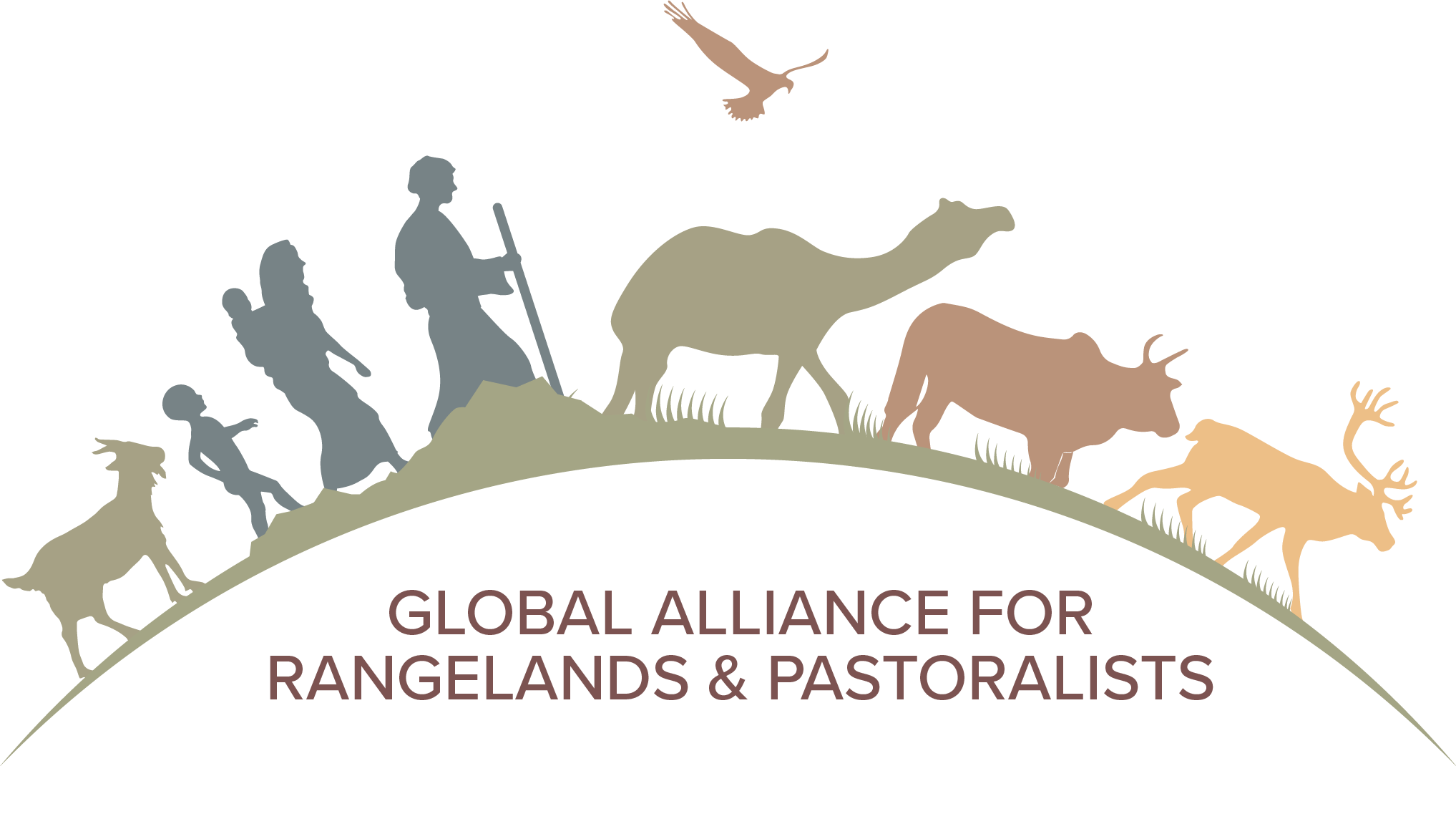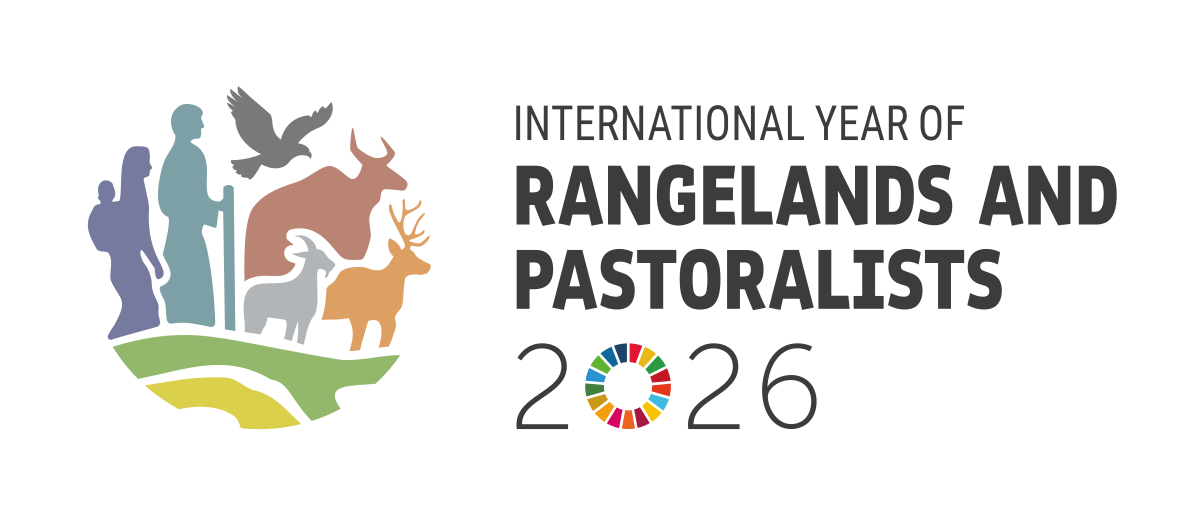Update on activities of the IYRP International Support Group
June 2024
The United Nations General Assembly (UNGA) has declared 2026 as the International Year of Rangelands and Pastoralists (IYRP). The IYRP reflects the importance of rangelands in creating a sustainable planet and supporting economic growth and resilient livelihoods for pastoralist communities around the world. The Food and Agriculture Organization (FAO) will be facilitating the implementation of the IYRP in 2026, but already now the IYRP International Support Group is actively involved in preparing for the International Year.
Global policy brief released https://iyrp.info/sites/default/files/IYRP_LDN_Policy_Brief%20high-res.pdf
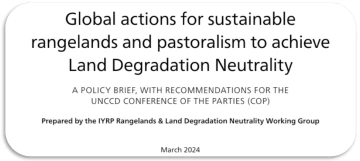
The International Support Group for the IYRP 2026 calls on the United Nations Convention to Combat Desertification (UNCCD) Conference of the Parties (COP) to adopt eight priority actions to meet the challenges facing rangelands and pastoralists worldwide, formulated by the IYRP Working Group on Rangelands & Land Degradation Neutrality (LDN):
Priority actions:
- Stop indiscriminate conversion of rangelands
- Recognise the importance of pastoral mobility
- Innovate and implement beneficial economic policies and technologies
- Promote integrated, multifunctional land use
- Strengthen participatory land governance and equity
- Increase rangeland and pastoral projects under the LDN Fund by 30%
- Commit LDN targets to rangelands and pastoralism
- Earmark 25% of the LDN Fund for knowledge and capacity building
IYRP 2026 lost a leader
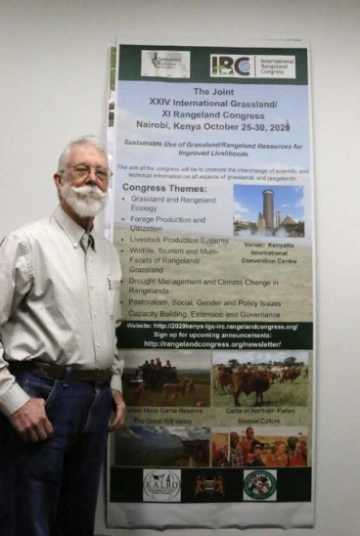
Jim O’Rourke, a pivotal figure in advocating for the IYRP 2026, passed away in his 82 nd year, on 5 March 2024, leaving behind a profound legacy. The journey towards the IYRP began with discussions at the 2008 Joint International Grasslands Congress / International Rangelands Congress (IGC/IRC) in Hohhot, Inner Mongolia, China, where Jim highlighted the significance of rangelands and the people who use and manage them and the urgent need for international awareness and action. Jim convened a small informal group to shape the IYRP's vision. In 2016, this group and several international bodies managed to ensure that the second UN Environment Assembly (UNEA-2) passed a resolution in favour of the IYRP. At UNEA-4 in 2019, Jim and his core group were able to pave the way for the Government of Mongolia to lead the process for an IYRP designation by the UN. Jim worked tirelessly to ensure that the next Joint IGC/IRC in Nairobi, Kenya, in 2021 would bring the needed support by eminent scientists and their governments for the IYRP. He visited FAO in Rome, Italy, to make known how an IYRP designation was gaining support from pastoralists, local governments, NGOs and scientists around the world. On 15 March 2022, the UN General Assembly declared 2026 as the IYRP. Jim’s unwavering dedication and perseverance continued to influence the growth and restructuring of the IYRP initiative and the building up of Regional IYRP Support Groups (RISGs). He continued to chair the IYRP International Support Group (ISG) until April 2022, when the Global Coordinating Group (GCG) was set up to take the next steps in preparing for 2026. After stepping down as global chair, Jim continued to be active in the RISG in North America until his passing. Jim’s leadership was crucial in achieving UN recognition of the IYRP 2026, leaving an indelible mark on global rangeland advocacy. See the IYRP eulogy to Jim .
Updates from the Global Secretariat of the IYRP alliance
Thematic Working Groups
The ten IYRP thematic Working Groups (WGs) are currently active to differing degrees.
Afforestation in Rangelands
- Paper published in Frontiers in Ecology and Environment : “Rangeland afforestation is not a natural climate solution”
- Paper published in The Conversation : “Planting trees in grasslands won’t save the planet”
Pastoralist Youth
- Membership of this WG has expanded, recruiting from outside normal IYRP networks
- New coordinator: Jacob Lekaitogo from Kenya
- WG is formulating some key messages and planning events, including a webinar to exchange with other WGs on youth issues
Rangelands & Biodiversity
- Concept note now available on the website
- Group is formulating its four core messages to make them easier to communicate
Rangelands, Pastoralists & Climate Change
- Habibou Assouma (CIRAD Burkina Faso) recently joined as a co-coordinator of this group, which has started developing its outputs
Pastoralism & Gender
- Key messages document translated into 14 languages and posted on IYRP website
- Group currently compiling films on women pastoralists for screening during events related to rangelands and pastoralists and possibly a film festival devoted to this theme
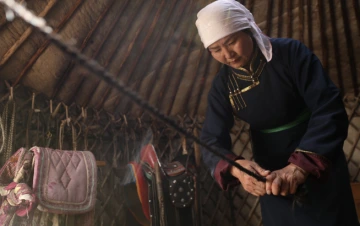
Photo by Dao Rina, Inner Mongolia
Rangelands & Land Degradation Neutrality
- Working Paper and policy brief now published on the website
Pastoralism & Land Rights
- Three teams organised within the WG to lead different outputs:
- Position paper on pastoralist land rights, including a glossary of terms
- Case studies archive
- Communications and social media
Mountain Pastoralism
- Renewed interest in re-establishing this WG; concept note being developed
Pastoralists & Water
- Organising its primary deliverables
- Collecting and sharing examples of successful water development in pastoral areas
Economics of Pastoralism
- Review of methodologies to study economics of pastoralism available on website in French and English
Global Co-chairs of the IYRP alliance
The three co-chairs have agreed on the following division of tasks:
- Burmaa Dashbal will be the liaison person with the Government of Mongolia and will focus on expanding IYRP 2026 support among pastoralist organisations and youth.
- Enrique Michaud will be the liaison person with global platforms and the FAO.
- Igshaan Samuels will be coordinating the RISGs and the liaison person with the FAO Commission of Forestry (COFO) and the International Rangeland Congress (IRC) 2025.
Updates from the Regional IYRP Support Groups (RISGs)
RISG Eastern & Southern Africa (ESA)
- On 5 March 2024, rangeland and pastoralist actors, including several RISG–ESA members in Uganda, attended a workshop focused on reviewing Uganda’s rangeland policy, aligning legislation, integrating technical expertise, and engaging civil society and political leaders. The event was officiated by Uganda’s Minister of Agriculture Animal Husbandry and Fisheries.
- The RISG subgroup in South Africa is in the process of developing a national action plan for 2026. It also aims to explore and advance critical themes within the IYRP framework to ensure a more focused approach.
- In April 2024, RISG–ESA members in Uganda and associated universities including the Swedish University of Agricultural Sciences (SLU) jointly developed the project “Sustainable rangeland restoration: building inclusive knowledge hubs (Livestock Cafés) for resilient pastoral livelihoods and rangeland restoration in the Eastern African drylands”. Livestock Cafés are knowledge-sharing hubs with experimental plots and demonstrations of innovative rangeland-restoration and water-management practices for socio-ecological sustainability.
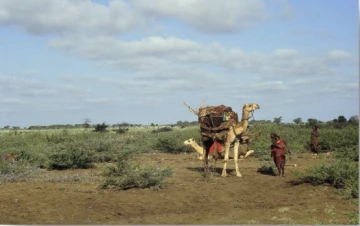
Photo by Wolfgang Bayer
- Several RISG–ESA members were involved in the East and Horn of Africa Pastoralist Symposium : In collaboration with the Intergovernmental Authority on Development (IGAD), Ethiopia’s Ministry of Irrigation and Lowlands hosted a one-week Horn of Africa Pastoralism Expo, ushered in by a Pastoral Day on 26 January 2024. The Expo highlighted the challenges and opportunities of expanding collaboration among IGAD countries and programmes to promote lasting resilience in their borderlands. It engaged stakeholders and proposed actionable strategies to foster resilience and sustainable development in the region. The event celebrated the rich culture of pastoralism and sought to bridge the past, present and future of pastoralism.
- At an Inter-Ministerial Policy Meeting on Livestock Development in the IGAD region, held on 25–26 January 2024, the findings of the study “Political-economy analysis of livestock sector in the arid and semi-arid lands (ASALs) of the IGAD region”, funded by AFD ( Agence française de développement / French development agency ), were presented. RISG–ESA members in the Coalition of Pastoralist Civil Society Organisations (COPACSO) represented pastoralists in this meeting, which sought policy support on how to address gaps and to build on achievements.
- In March 2024 in Zimbabwe, the Africa Protected Areas Congress (APAC) brought together diverse and influential participants to foster collaboration and strategic partnerships to address challenges faced in African protected and conserved areas. It engaged African Protected Area Directors, government representatives, youth, Indigenous Peoples and Local Communities (IPLCs), civil society, the private sector and international nongovernmental organisations (NGOs). Participants had in-depth discussions on pressing issues and they agreed on a set of actions for Africa’s protected and conserved areas authorities and IPLCs to implement as part of attaining the Kunming-Montreal Global Biodiversity Framework. The conference was key for all pastoralists dealing with conservancies set up on pastoral land in Africa. Several RISG–ESA members took part.
RISG Central Asia & Mongolia (CAM)
- In an online meeting on 17 January 2024, the Environment and Development Association JASIL, a member of the RISG–CAM, reported on activities to support the IYRP 2026 in Mongolia and Central Asia to the Regional Coordination Unit (RCU) of the International Land Coalition (ILC). During this meeting, support for the IYRP 2026 was agreed to be included in the strategy and work plan of the National Land Coalition (NLC) in Mongolia and among the priority areas for 2024. In accordance with this decision, national-level support for the IYRP was included as one of three sub-objectives of the NLC Mongolia Strategy for 2024–2027 and in the 2024 work plan.
- On 27 March 2024, a co-chair of the RISG–CAM informed the Mongolian National Working Group about support for the IYRP 2026 and proposed that some of the RISG–CAM activities be included as collaboration in the national-level action plan, which is currently being drawn up.
- A national meeting was held of the Mongolian National Working Group for the IYRP 2026. A decree in support of the IYRP is being developed. Three Ministries agreed to make budgets available for the IYRP and are planning a conference on rangelands and pastoralists.
RISG Europe
- About 80 pastoralists gathered in Montpellier, France, on 1 February 2024 for a day of discussions including collaborative preparation for the IYRP 2026. They identified actions to be considered for the IYRP 2006 and discussed how to create global synergy between role players related to pastoralism.
- The RISG–Europe was represented in the Canary Islands during the International Cheese Forum. Several Michelin Star chefs, especially of renowned restaurants, being very interested in first-class food, are excellent promoters of pastoral products.
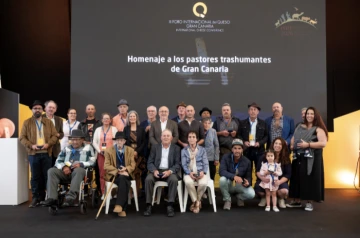
- The RISG–Europe was represented at an event in Las Palmas to honour transhumant shepherds. The Government of Gran Canaria and the Government of the Canary Islands showed great interest in promoting the IYRP 2026 during events over the next few years.
- The RISG–Europe was represented at the Gourmet Fair in Madrid on 20–25 April 2024 at the Spanish Artisan Cheese Stand and the Cheese Tunnel. Representatives of many embassies and Ministers from several countries were made aware of the IYRP 2026 and received information material.
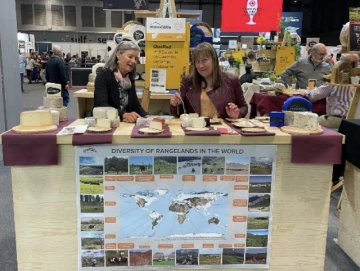
- Several Carpathian countries are interested in joining the United Nations Educational, Scientific and Cultural Organisation ( UNESCO) declaration of transhumance as Intangible Cultural Heritage (ICH). Therefore, Rumania recently opened the third wave of the declaration, inviting all countries that have had transhumance declared as ICH at national level to participate so that the third wave of the declaration can be approved in 2026.
- On 12 March 2024, a consultation day on “Empowering pastoralist women in mountain regions: navigating environmental and gender challenges” was held under the Commission on the Status of Women of the UN Economic and Social Council as part of the activities of the Carpathian Convention . During this event, an RISG–Europe co-chair promoted the IYRP 2026 and its Working Group on Pastoralism and Gender.
RISG North America
- Several IYRP 2026 events were hosted at the annual meeting of the Society for Range Management (SRM) held at Sparks, Nevada, from 28 January to 1 February 2024. Events included: i) an IYRP film festival ii) an oral symposium bringing voices on IYRP rangeland issues; and iii) an action-planning IYRP workshop for North America, with brief updates on action plans for the USA, Canada and Mexico. SRM made several hundred complementary virtual registrations available to IYRP 2026 global members.
- Two proposals concerning the IYRP 2026 are being prepared: i) production of a documentary film on United States (US) rangelands led by a team at the University of Arizona, targeted for the National Institute of Food and Agriculture of the US Department of Agriculture (NIFA/USDA); and ii) an outreach initiative to publicise issues relevant to US rangelands via communication and artistic methods, led by a team at Washington State University, targeted for the Western Sustainable Agriculture Research and Education (SARE) grant programme.
- Also underway are three other SRM initiatives relevant to the IYRP: i) an SRM task force is proposing a webinar series that will include all eleven IYRP regions and the 12 monthly IYRP topics; ii) the SRM Young Professionals Conclave is considering plans to support a global networking event for rangeland stakeholders; and iii) the SRM International Affairs Committee (IAC) is proposing that a long-time SRM travel fund that is used to support international attendees at SRM annual meetings be re-named for the former IYRP ISG, Jim O’Rourke, who passed away on 5 March 2024.
RISG Australasia
The IYRP in Australia now has three state-based IYRP subgroups in Western Australia, Queensland and New South Wales. The focus is on establishing grassroots groups, with all state chairs being pastoralists. This is in keeping with the desire of Jim O’Rourke, a founder of the IYR initiative.
The role of these subregional IYRP groups in Australia is to:
- find case studies to highlight in the media
- seek support from other organisations/agencies that run activities across the rangelands
- develop collaborations to run activities around the monthly IYRP themes for 2026.
Other projects completed in the past month include:
- Preliminary brochure produced, explaining the role of the IYRP in Australia, and encouraging pastoralists to join
- Video produced for IYRP by the Southern Rangelands Pastoral Alliance; the draft can be found here: https://spaces.hightail.com/receive/P9OZYGlRLm
- A few Australian rangeland pastoralists visited East Africa and were introduced to a regenerative agriculture group in Kenya; they also visited Canberra, Australia, for a presentation and meetings.
The Southern Rangelands Pastoral Alliance made the presentation at the Australian Parliament and focussed on the importance of the IYRP 2026. The presentation was part of an inaugural Foundation for Sustainable Economic Growth for Regional Australia (SEGRA) Expo, to provide an opportunity for people in rangelands and other rural areas to showcase innovative projects to policymakers and politicians.
Members of the state-based IYRP groups also met with various officials in Canberra to highlight the IYRP’s goals and activities. Meetings were held with:
- The Second Secretary of the Kenyan High Commission based in Canberra: the groups outlined the IYRP and specifically the Kenyan Friendship Group being formed between IYRP and Kenyan pastoralists. The Second Secretary will write to the Council of Governors in Kenya to expand connections with local pastoralists in the 47 Kenyan counties.
- The Honourable Melissa Price, Member of Parliament for Durack, which covers half of the rangelands of Western Australia: she was very supportive and promised to be an ambassador of the IYRP 2026.
RISG South Asia
- Indian members of the RISG–South Asia attended a National Workshop on Resilience of Indian Rangeland and Pastoralists , held on 21 – 23 Dec ember 2023 . The workshop objective was to facilitate holistic understanding of issues around rangeland management and pastoralism in different parts of India and to develop strategies for regenerating pastureland and common lands and to promote sustainable pastoralism. Image
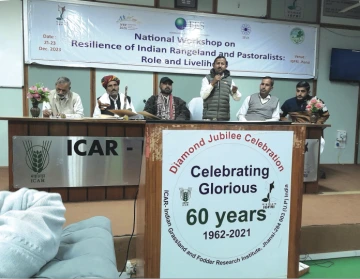
Some recommendations of the workshop included :
- Replace t he term “ wasteland ” to describe rangelands in India with a more applicable term .
- Formulat e a National Pastureland Policy for the protection, restoration and management of rangelands , and create a National Grassland Authority to implement the objectives of the policy and discourag e conversion of rangelands for cultivation or tree planting.
- Create a centralised database (Commons Registry) on available rangelands areas , commons, mapping of livestock grazing by pastoralist communities, mobility and their seasonal migration system.
- Support initiatives by communities or individuals to control invasive species, conserve biodiversity, practise social fencing and regulate grazing, and document best practices including traditional institutions and local knowledge.
- Establish community - based seedbank networks for rangeland grasses, fodder crops and trees in different climatic zones to conserve, exchange and promote seeds and propagation materials of native grass species.
- Recognise and grant both individual and community forest grazing rights to pastoralists and residents as per provision of Forest Rights Act 2006 (FRA 2006).
- Issue identity cards for pastoralists who are involved in long - distance mobility crossing district and state boundaries.
- Analyse and acknowledge the contribution of pastoralism to employment , products and incomes in local communities .
- Attract youth in sustainable pastureland and pastoral system s with opportunities for adding value to pastoral products and by motivating them to be proud of their culture.
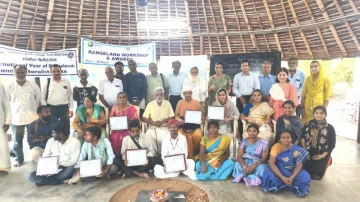
RISG West and Central Africa (WCA)
- The RISG–WCA is organising a Symposium on (Agro)Pastoralism in Africa in support of the IYRP 2026. The event will take place on 12–14 November 2024 in Senegal; pastoralist associations in West and Central Africa are actively involved in organising the symposium.
- Panel sessions on IYRP-related priorities in the region will feature the participation of NGOs and pastoralist associations to empower the RISG–WCA. The conference will focus primarily on Africa, covering various thematic areas related to pastoralism. However, key speakers from other regions are also invited to share experiences and solutions from their respective countries and regions.
- Some IYRP Global Secretariat members will attend the symposium. The Government of Mongolia will be invited as main guest country, as it proposed the IYRP to the United Nations.
RISG South America
- New organisations are getting involved in the RISG–South America, e.g. Agrosavia, Colombia.
- One of the RISG co-chairs is also involved in FAO’s Steering Committee for the International Year of Camelids (IYC) in 2024.
- The Government of Peru sent a letter of support for the IYRP 2026.
Upcoming activities
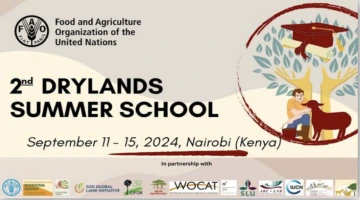
The deadline for applications for the Summer School is 5 July 2024. More information can be found at: https://www.fao.org/dryland-forestry/working-group/cofo-wg- summer - school /en/
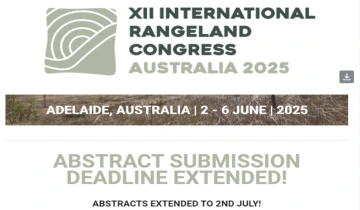
Two concurrent sessions will be hosted by the IYRP 2026 ISG at IRC 2025 under the themes:
- Valuing rangelands and pastoral systems for their societal contribution
- Co-design, partnerships and incorporating traditional knowledge for more enduring rangeland outcomes
In addition, the IYRP 2026 ISG and the IRC will be hosting a plenary session on key emerging issues affecting rangelands and pastoralists at global level.
One concurrent session will be devoted to films on pastoralists worldwide, organised by a member of the IYRP Global Secretariat.
A pre-conference workshop on "Considering multifunctionality of pastoralism to foster fruitful contributions of pastoralism to growing societal challenges” organised by the Global Agenda for Sustainable Livestock (GASL) will have inputs from the IYRP alliance.
Visit this webpage for more details about the IRC2025: https://irc2025.rangelandcongress.org/
To find out more about IYRP 2026, go to www.iyrp.info or contact iyrp2026@gmail.com

